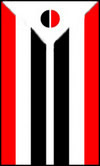Lesson Six - Part Two
Inanimate Nouns and Possession
The following is an old Ghost Dance Song.
| heisonoonin houu | Our father the crow, |
| beehiineenitii[t] | He created everything. |
| heisonoonin | Our father. |
Notice that when it talks about "our" father, there is no separate word for "our." Instead, "our father" is all one word. In fact, the beginning prefix he- indicates 'your,' while the final suffix -in changes the meaning to 'yours and mine' – in other words, 'our.' This is called possession, and the details on who the possessor is – whether it's 'my father' or 'your father' or 'her father' – are always indicated by prefixes and suffixes, which we will learn in this section.
| he-isonoon-in | houu | beehii-neenitii-t | he-isonoon-in |
| our father | crow | all-create/do-he | our father |
Arapaho uses a set of prefixes to indicate ownership - "my name," "your cup." The dashes are added simply to help you see the new parts that are added to the word. They are not actually part of written or spoken Arapaho.
| my name | my names | ||
| your name | your names | ||
| his/her name | his/her names |
| our name / names | |
| our(incl) name or names | |
| your(pl) name or names | |
| their name or names |
The -oon- after the noun is simply a modified form of the plural -ono. It is required with 1plural, 12, 2plural, and 3plural. When a noun already ends with long vowels or diphthongs, then there is no additional change: touyoo becomes notouyoo, 'my cup,' notouyoono, 'my cups', hitouyooninoo, 'their cups.' Note that Arapaho does not distinguish between "our name" and "our names."

